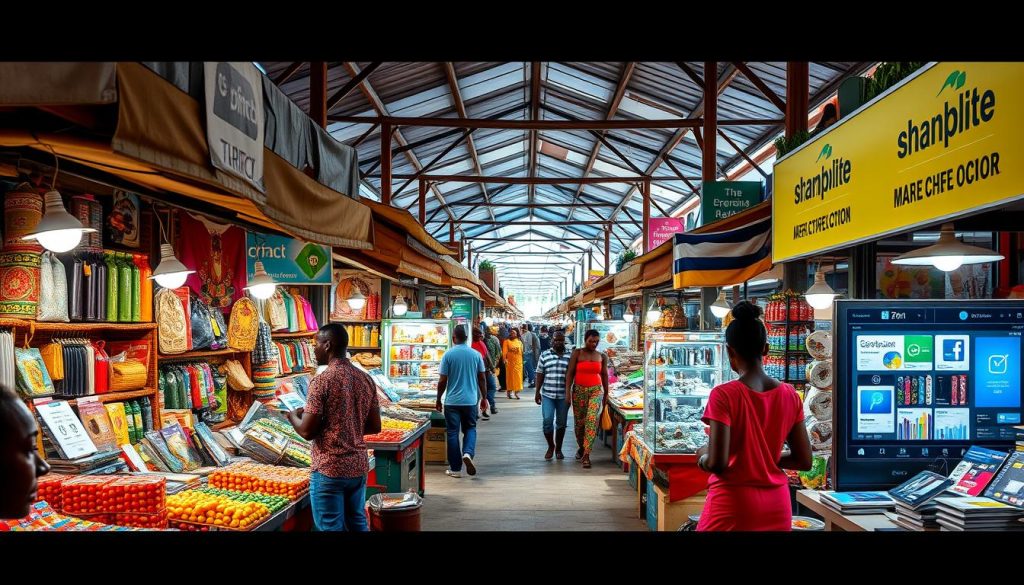Looking ahead to 2025, Africa’s e-commerce scene is expected to boom. More people are going online, and the young population loves mobile tech. This makes online shopping a big deal, opening doors for new businesses.
This section explores the exciting opportunities in Africa’s e-commerce. We’ll look at different areas and strategies. It’s all about finding the best ways to succeed in this growing market.
Understanding the E-commerce Landscape in Africa

The e-commerce scene in Africa has seen big changes thanks to new tech and more internet access. The digital economy is growing fast, offering chances for both big and small businesses. It’s expected to grow even faster than many other markets around the world.
Studies show that online shopping in Africa is growing well, but it varies by region. Northern Africa often has the biggest market share. Southern Africa, on the other hand, is showing strong growth. This difference comes from things like internet access, infrastructure, and how people shop.
Big names like Jumia, Takealot, and Kilimall are leading the way in online shopping. But local startups are also popping up, trying to meet the needs of African shoppers. This shows the sector is full of potential for growth.
As the digital economy grows, it’s key to understand the e-commerce scene well. Groups like the International Telecommunication Union and the World Bank offer insights into what’s driving these trends. This knowledge helps businesses tackle challenges and grab opportunities in Africa’s e-commerce world.
The Rise of Online Consumerism in Africa

Online shopping in Africa has grown a lot in recent years. This is due to better living standards, more people moving to cities, and more smartphones. As the internet gets faster, more people are buying things online.
Surveys show that more Africans prefer shopping online. They like the convenience and the wide range of products. They also feel safer and more confident about buying online.
What’s driving this trend includes:
- More smartphones, making it easy to shop online.
- More people in cities looking for quick shopping options.
- Improved ways to pay online, making people trust it more.
- More awareness of global brands and products online.
This change is a big opportunity for businesses in Africa. Knowing how people shop online is key for success. As shopping habits change, companies need to keep up to stay relevant.
E-commerce Business Ideas in Africa
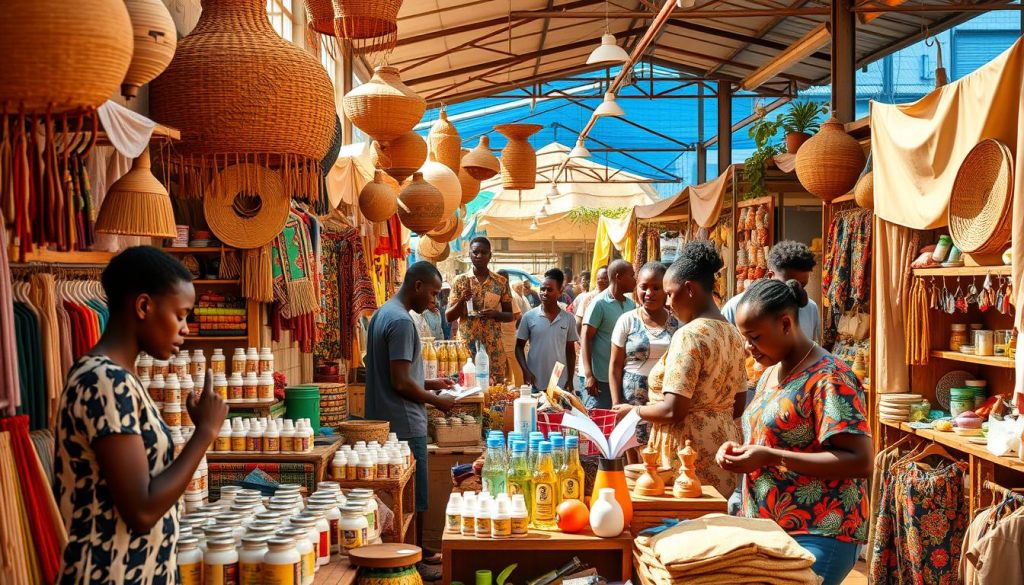
Africa’s e-commerce scene is full of chances, especially in niche markets. Entrepreneurs are now focusing on online stores for specific groups. This not only meets market needs but also boosts community ties and supports local crafts.
Exploring Niche Markets
Niche areas like handmade items, organic goods, and local fashion are very popular. Sites like Jumia offer a wide range of products. Meanwhile, smaller platforms like Etsy are starting to appear in Africa.
These platforms help local artists and makers reach more people. They change old ways of trading into new e-commerce methods. This shows how niche e-commerce in Africa is growing and meeting consumer needs.
Leveraging Technology and Innovation
Innovation is key to advancing e-commerce in Africa. New tech like mobile apps and AI chatbots offer unique shopping experiences. Payment systems like Paystack and Flutterwave make buying online safer and easier.
These innovations make shopping online smooth and help Africa’s digital growth. They play a big part in the country’s e-commerce journey.
Mobile Commerce Opportunities in Africa
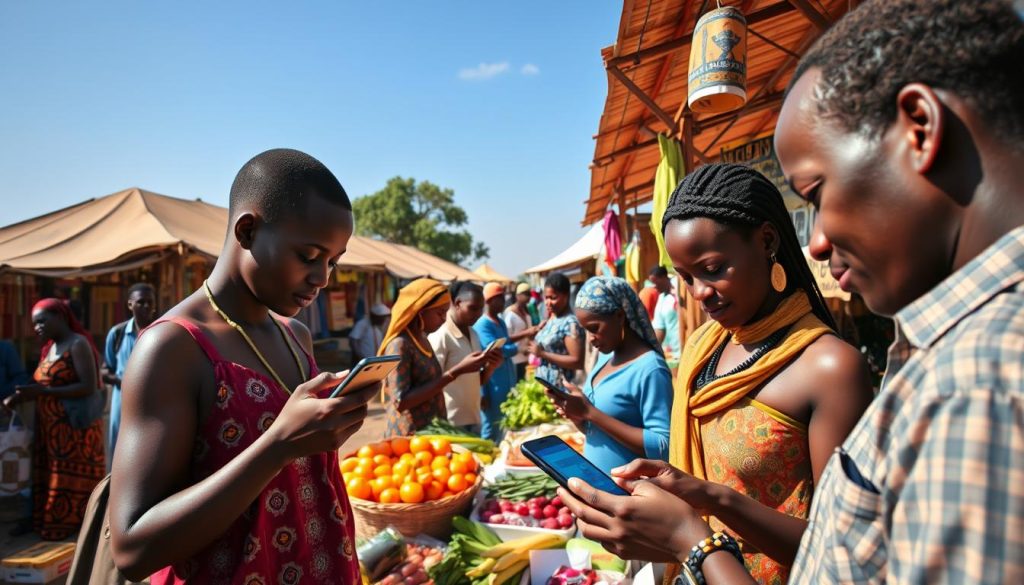
Mobile commerce in Africa is growing fast. This is thanks to high mobile phone use. Smartphones are becoming key for many sectors.
Shopping on mobile has become popular in areas like fashion, food, and electronics. This makes it a lively field for businesses.
More people are using mobile apps for ease and convenience. Sites like Jumia and Takealot show how mobile tech helps meet shopper needs.
Mobile apps have made a big difference in how we shop. Apps like Yummy and Jumia Food have changed food delivery. They show how mobile commerce can improve services and keep users interested.
- Increased smartphone usage among consumers
- Expanding access to mobile internet across urban and rural areas
- Availability of diverse payment solutions facilitating transactions
These factors help mobile shopping grow in the region. As businesses keep up with trends, mobile commerce’s future looks bright.
Social Media Commerce: A Growing Trend

Social media commerce in Africa is changing how businesses talk to customers. Using influencer marketing in e-commerce is a strong way to increase online sales. Brands that work with influencers often see more people seeing and interacting with their content, leading to more sales.
Utilising Influencer Partnerships
Working with influencers helps brands reach more people and gain trust. Good campaigns show how influencers can tell stories that connect with African consumers. This approach not only sells products but also builds loyalty and trust with customers.
Companies like Jumia and Takealot have seen big increases in sales and engagement by teaming up with influencers. Their efforts have shown the power of influencer marketing in Africa.
Engaging Audiences with Compelling Content
Creating content that grabs people’s attention is key for online branding. In Africa, using stories and eye-catching posts can really boost engagement. Businesses should aim to tell real stories that fit the local culture and values.
Listening to what the community says can help brands build strong connections with their audience. This approach can lead to more sales in a crowded market.
Sustainable E-commerce Models in Africa
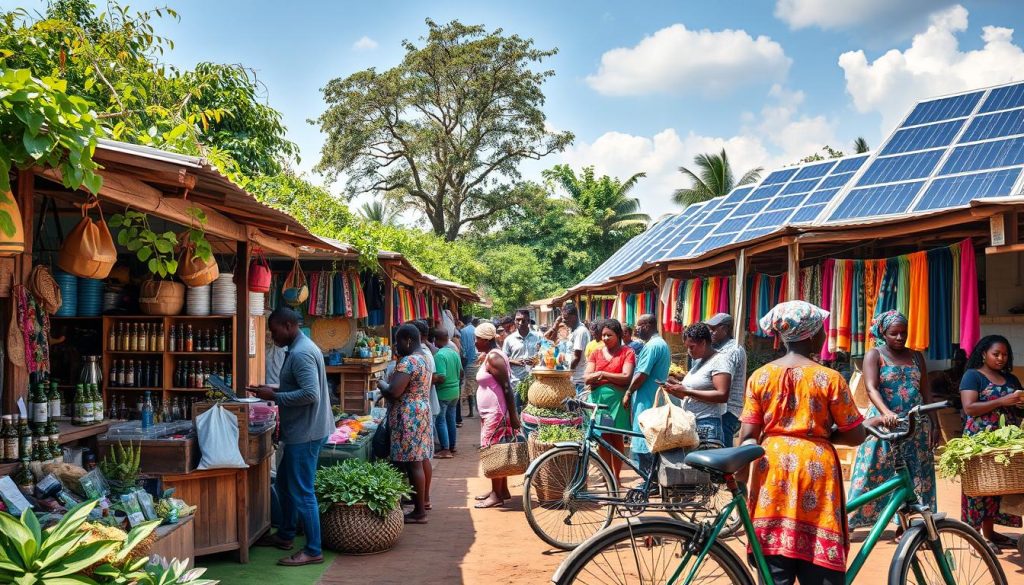
The world of sustainable e-commerce is changing fast in Africa. More people want to shop in a way that’s good for the planet. This means businesses are now focusing on being eco-friendly.
Companies in Africa are setting a good example. They use local materials to cut down on carbon emissions. This helps local economies and builds stronger communities.
Some notable examples include:
- Eco-friendly packaging options that minimise waste and enhance recycling.
- Partnerships with local producers to ensure that products remain within the region, promoting sustainable supply chains.
- Utilising renewable energy sources in logistics and warehousing to lower energy consumption.
These efforts show that being green can also be good for business. People are more likely to buy from brands that share their values. This makes eco-friendly business models key to online retail growth in Africa.
Local vs. International E-commerce Platforms
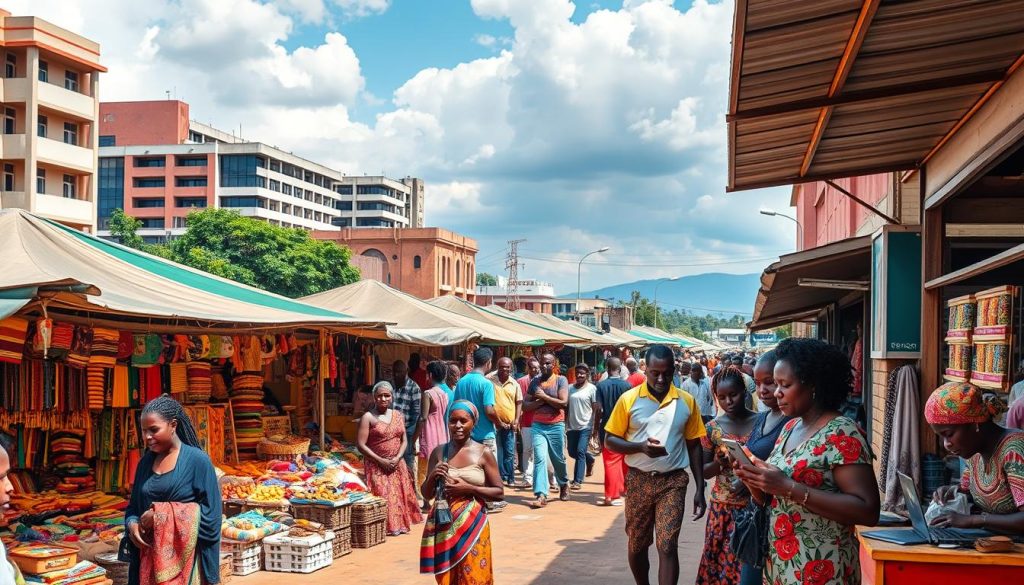
The e-commerce world in Africa is full of contrasts. Local platforms like those in Africa face off against giants like Amazon and Alibaba. Local sites know the local tastes and customs better, making them more adaptable to the market.
Platforms like Jumia and Takealot use their knowledge of local shoppers to offer unique services. They tackle the big challenges faced by global players, like getting goods to customers and handling payments in Africa. This lets them provide solutions that fit local needs perfectly.
But, global players have their strengths too. They offer a wide range of products and are well-known brands. They attract shoppers looking for variety and reliability. Yet, they might find it hard to connect with local tastes and preferences.
Both local and global players need to stay alert to changing consumer habits. As e-commerce expands, knowing the local and global markets well is key to success.
The Impact of Logistics on E-commerce Growth

Logistics is key to e-commerce growth in Africa. The continent faces many logistics challenges. These issues affect the efficiency of the e-commerce supply chain.
Poor infrastructure and limited access to reliable delivery solutions are major barriers. They hinder the growth of online businesses.
Many companies struggle to manage their supply chains efficiently. These problems affect delivery times and erode customer trust. Successful players have found ways to overcome these challenges.
Kobo360 is a great example. It has streamlined logistics operations. This has improved the e-commerce supply chain for many businesses.
Optimising Supply Chain Management
To tackle these challenges, businesses need to optimise their supply chain management. They should adopt new technologies and strategies. This improves delivery solutions.
By using tracking systems and real-time data analytics, companies can boost their efficiency. Working with local logistics providers also helps. These steps reduce costs and improve delivery times, benefiting consumers.
Identifying Key Target Demographics

Understanding target demographics in Africa is key for e-commerce success. Consumer segmentation shows different groups that shape buying habits. Age, income, and where people live are the main factors.
More young people are shopping online, showing a love for mobile and social media. This age group is vital for businesses to reach.
Income also matters; as it grows, so does what people can buy. E-commerce should offer good value to middle-income shoppers.
Urbanisation adds complexity but also chances. Cities often have better internet and mobile use, making online shopping easier. Marketing to city folks can boost sales.
- Young consumers: Primarily aged between 18-35, active on social media.
- Middle-income earners: Seeking quality product offerings within budget constraints.
- Urban dwellers: Higher internet access and mobile usage rates.
By knowing these demographics and their needs, e-commerce in Africa can improve customer interaction and grow.
Payment Solutions and E-commerce Success
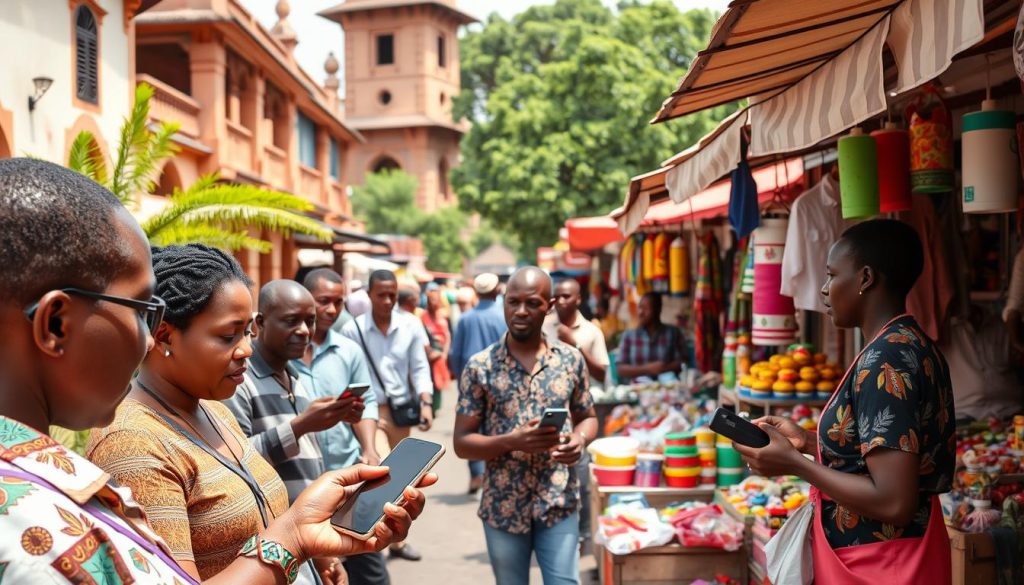
E-commerce in Africa thrives on good payment solutions. Options like digital wallets, mobile payments, and cash-on-delivery boost trust and happiness. M-Pesa has changed mobile payments, making them easy and local.
Online payment methods make shopping easier for everyone. Fintech in e-commerce brings new solutions for African businesses. These help with transactions and bring more people into online shopping.
- Digital wallets, such as PayPal and Google Pay, offer secure transaction options.
- Mobile payment platforms like Flutterwave simplify cross-border payments for merchants.
- Cash-on-delivery remains popular in areas where digital payment options are limited.
As e-commerce grows, better payment solutions in Africa are key. They help businesses reach more customers and work more efficiently. Knowing these payment methods helps entrepreneurs meet their customers’ needs.
Best Practices for E-commerce Website Design
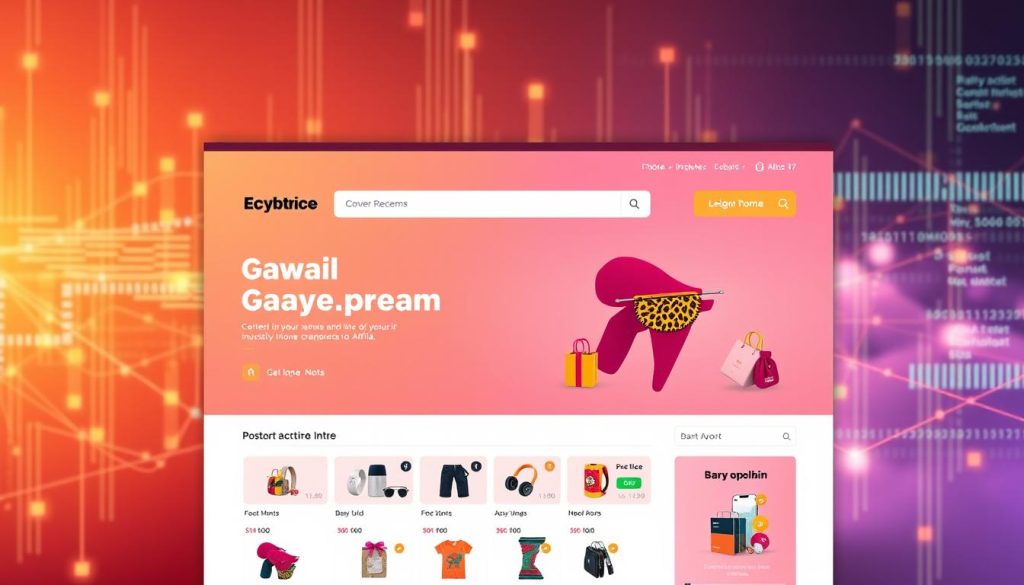
In the world of e-commerce, a well-designed website is key to success. It helps drive sales and improve user experience in Africa. Making your site easy to navigate and clear in its calls to action can really boost sales. Here are some top tips for designing your e-commerce site:
- Mobile Responsiveness: More people are shopping on their phones. So, it’s vital to make sure your site works well on mobiles.
- Streamlined Navigation: Organising your products in a clear way helps customers find what they need fast.
- High-Quality Imagery: Using professional images makes your site more engaging and trustworthy.
- Fast Loading Times: A quick site is important. Slow sites can scare people away.
- Secure Payment Options: Offering safe payment methods makes customers feel confident when they’re checking out.
Leading e-commerce sites in Africa have adopted these strategies. They focus on making the user experience better. This has led to happier customers and more loyalty. Investing in good design not only makes shopping better but also helps your business grow.
Legal Considerations for E-commerce Start-ups

For e-commerce start-ups in Africa, understanding the legal landscape is key. Knowing the e-commerce regulations is crucial for success. Start-ups must follow laws on data protection, consumer rights, and taxes.
Data protection laws are vital for building trust. E-commerce businesses need strong privacy policies to protect customer data. This is especially important in countries like South Africa, where data protection laws are strict.
Consumer rights laws also shape how e-commerce works. Businesses must be clear about prices, returns, and warranties. Following these laws helps protect customers and builds trust.
Taxes are another hurdle for e-commerce start-ups. It’s important to know about VAT and sales tax. Not paying taxes can lead to serious legal trouble.
In short, dealing with e-commerce laws in Africa is complex. Start-ups need to focus on legal compliance for long-term success. This is part of a strategic plan for the digital market.
Leveraging Data Analytics in E-commerce

Data analytics is key in the fast-changing world of e-commerce. It helps businesses make smart choices. By using consumer insights from Africa, companies can really get to know their customers. This knowledge helps them improve their plans.
Businesses use tools to look at important data like sales, customer actions, and how well ads work. They use different ways to study this data, like:
- Using big analytics tools like Google Analytics to see how websites do.
- Getting CRM software to learn about customer likes and dislikes.
- Testing different ads to find out what works best.
These methods help e-commerce sites make better choices. By spotting trends, companies can tweak their marketing, products, and services. This leads to happier customers and more loyalty.
Marketing Strategies for E-commerce Businesses
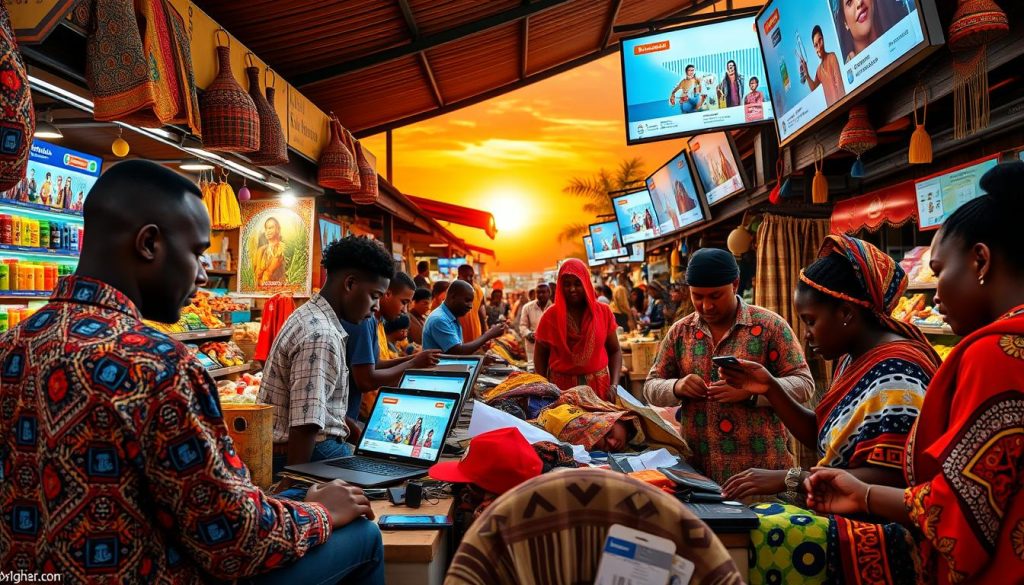
Effective e-commerce marketing strategies are key for businesses in Africa’s online market. As digital marketing in Africa grows, companies must keep up. They need to use targeted tactics to attract customers. Diverse marketing methods can boost brand visibility and sales.
Search engine optimisation (SEO) is a vital tool. It helps improve website rankings, drawing in more visitors. Using the right keywords is crucial for a strong online presence.
Social media marketing is also essential. Sites like Facebook, Instagram, and Twitter are great for reaching customers. Good content, influencer partnerships, and interactive campaigns build a loyal fan base. Social media lets brands share their stories, connecting with their audience.
Email campaigns are another key strategy. Personalised emails can increase sales by sharing news and offers. Segmenting email lists based on customer behaviour makes messages more effective.
Using data analytics is crucial in today’s digital world. It helps track customer interactions and improve marketing. Brands can refine their strategies with data, leading to better results.
Combining these strategies creates a strong marketing plan. E-commerce businesses in Africa must keep evolving to meet customer needs. Understanding local digital marketing trends can improve engagement, helping with customer acquisition and retention.
The Future of E-commerce in Africa

The future of e-commerce in Africa looks bright, thanks to new tech and changing how people shop. More people will have mobiles and internet, making online shopping grow fast. Experts say we’ll see big increases in sales of clothes, gadgets, and food delivery.
Businesses will start using new ways to meet local tastes. Shoppers want unique experiences, so companies will use data and smart marketing. This will help them connect better with customers and keep them coming back.
Also, paying for things online will get easier and safer. Digital wallets, mobile payments, and even cryptocurrencies will make shopping smoother. Keeping transactions secure and easy is key to winning customer trust.
In short, the future of e-commerce in Africa is full of promise. Businesses will use new tech and listen to what customers want. Keeping up with online shopping trends is crucial for success in this fast-changing market.
Success Stories: E-commerce Ventures in Africa
The African e-commerce scene has grown fast, with many success stories. Companies like Jumia and Takealot are leading the way. They have overcome big challenges, like logistics and payment issues, to succeed.
Jumia is known as the ‘Amazon of Africa’. It started online shopping in Nigeria, Kenya, and more. It shows how important it is to know your local market well. It also made shopping online affordable by using mobile payments and internet access.
Takealot’s success comes from using data and good marketing. It focuses on making customers happy and has efficient delivery. Its story proves that with the right plan and local knowledge, e-commerce can grow and inspire others in Africa.

